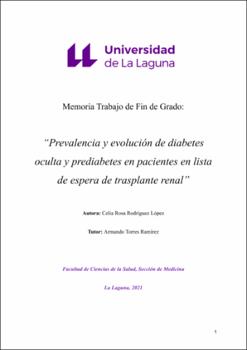Prevalencia y evolución de diabetes oculta y prediabetes en pacientes en lista de espera de trasplante renal
Author
Rodríguez López, Celia RosaDate
2022Abstract
INTRODUCCIÓN: Las alteraciones del metabolismo de la glucosa desenmascaradas con
una sobrecarga oral de glucosa (SOG) en pacientes en lista de espera de trasplante renal
(LETx) son frecuentes y aumentan el riesgo de diabetes de novo post-trasplante renal. Su
prevalencia, factores de riesgo, mecanismos fisiológicos y evolución han sido poco
estudiadas.
MÉTODOS: Se estudiaron 192 pacientes no diabéticos en diálisis. Se les realizó una SOG
basal y una anual hasta el trasplante. Los pacientes se clasificaron en normales (N), Glucosa
Basal Alterada aislada (IFG), Intolerancia a la Glucosa (IGT), y Diabetes Oculta (DMoc). Se
compararon para cada grupo las variables clínicas y de funcionalidad de la célula beta
(Sensibilidad, Secreción, e Índice de Disposición de la Insulina) transversalmente (basal) y
además su evolución a uno y dos años.
RESULTADOS: La prevalencia de los diferentes fenotipos fue de 65.5% N, 4,2% IFG, 24%
IGT y 6,3% DMoc. Se demostró que estos dos últimos grupos tenían disminuída la
sensibilidad y secreción de insulina. Los pacientes con IFG aún tenían una secreción
conservada, pero insuficiente para contrarrestar la resistencia. Las variables asociadas a una
SOG patológica fueron: edad >52 años, Glucemia >100 mg/dl, y tratamiento con estatinas.
Tras un año en LETx, un tercio de los pacientes empeora.
CONCLUSIONES: a) Un tercio de los pacientes en LETx tienen alteraciones ocultas del
metabolismo de la glucosa; b) Proponemos que los pacientes en tratamiento con estatinas,
>52 años, o Glucemia basal >100 mg/dl son candidatos a realizar una SOG. BACKGROUND AND AIMS: Alterations in glucose metabolism unmasked with an oral
glucose tolerance test (OGTT) in patients on the waiting list for kidney transplantation
(WLKTx) are frequent and increase the risk of post-kidney transplantation new-onset
diabetes. Its prevalence, risk factors, physiological mechanisms and evolution have been little
studied.
METHODS: 192 non-diabetic patients on dialysis were studied. A basal OGTT and an
annual OGTT were performed until transplantation. The patients were classified as normal
(N), Isolated Fasting Glucose (IFG), Glucose Intolerance (IGT), and Hidden Diabetes
Mellitus (HDM). For each group, the clinical and functional variables of the beta cell
(Sensitivity, Secretion, and Insulin Disposition Index) were compared transversely (baseline)
and as well as their evolution at one and two years.
RESULTS: The prevalence of the different phenotypes was N:5.5% , IFG: 4.2%, IGT: 24%
and HDM: 6.3%. These last two groups were shown to have decreased insulin sensitivity and
secretion. The IFG patients still had preserved secretion, but insufficient to counteract the
resistance. The variables associated with a pathological OGTT were: age >52 years, blood
glucose >100 mg/dl, and treatment with statins. After one year on WLKTx, a third of the
patients got worse.
CONCLUSIONS: a) A third of the patients in WLKTx have hidden alterations of glucose
metabolism; b) We propose that patients under treatment with statins, > 52 years old or basal
blood glucose >100 mg/dl are candidates for a OGTT.





